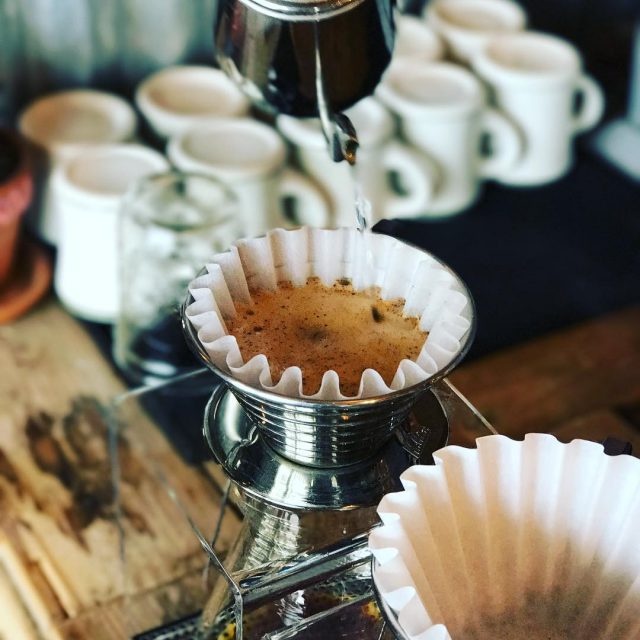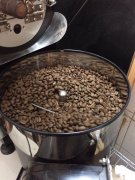The skill and function of steaming Coffee necessary conditions for Gold Cup extraction of Coffee
Steaming has two purposes:
The first is to release the gas in the coffee particles, mainly carbon dioxide. In general, the closer it is to baking time, the more bubbles there will usually be during pre-soaking. Deeper roasted coffee beans also release more gas during steaming than lighter roasted coffee beans because of their lower water content.
Second, if the coffee particles after the exhaust gas can be evenly saturated with water, the subsequent extraction can be uniform. In short, the air between the coffee particles is heated and expands during steaming, releasing a large amount of carbon dioxide, and the temporary void layer between the coffee particles will provide the space required for hot water to penetrate the powder layer during formal water injection.
If the initial step of hand washing is less steamy, a large amount of hot water will follow a local and few channels through the powder layer, which will lengthen the drip time, which may lead to excessive extraction, because the extraction time will be longer, more substances will be dissolved, and the taste may be more sour and irritating, or the mouth may be full of impurities. However, once you can pay attention to the steaming action and then start the formal water injection, the hot water will be able to pass through the filter layer composed of coffee powder evenly, and then achieve the purpose of uniform extraction.
Here are a few things that will help to achieve a smooth steaming:
Before steaming, make sure the coffee powder is as level as possible in the strainer or filter paper.
Steaming when the force of water injection is not large, gentle.
The amount of water used during steaming is preferably 10% of the total amount of water. For brewing 240 ml of coffee, the amount of water required for steaming is about 24 - 30 ml.
During stewing, the amount of extract flowing down should be as small as possible; when there is too much extract in the next pot, reduce the amount of water injected, or pay attention to the degree of grinding.
Steaming time is about 30 seconds to 60 seconds. When the expansion of the coffee powder surface is over and the surface is about to collapse, it means that the steaming is completed and the first water injection can be started. Ideally stewed, the coffee grounds expand slowly in contact with hot water, as if the coffee grounds were constantly pushing hot water upward. The sum of the surface tension of the water and the pressure of the carbon dioxide released from the coffee powder at this time will slightly increase the gravitational acceleration of the water and the downward pull caused by capillary phenomenon. The best time to steam will be when the expansion reaches its limit, the sum of the surface tension of water and the pressure generated by the release of carbon dioxide from coffee powder is slightly equal to the downward pull caused by the acceleration of gravity and capillary phenomenon of water. Stable water injection speed, at this time, the void layer before coffee powder particles has not collapsed, which is a good time to start the first water injection. Although longer stewing time may give a thicker taste, it also affects the brewing result due to the larger surface area in contact with air and the faster the temperature drops.

Important Notice :
前街咖啡 FrontStreet Coffee has moved to new addredd:
FrontStreet Coffee Address: 315,Donghua East Road,GuangZhou
Tel:020 38364473
- Prev

Coffee machine maintenance bar daily coffee machine maintenance
1, daily bar coffee machine cleaning and maintenance 1, put the backwashing gasket in the double handle, buckle to the brewing head of the coffee machine; 2, turn off the machine; 3, press the 60ml key to turn on the machine until cleaning appears on the screen, release the 60ml key for automatic cleaning; 4, take the 600ml brushed steel cup to add 300ml cold water, put into the steam pipe to clean (about 60); 5, clean the filter plate.
- Next

Coffee roasting fun self-baked boutique coffee beans
First of all, high-quality coffee beans are usually sold in two forms: mixed bean formula (Blends): the following different harvest seasons or two or more different producing areas of coffee beans mixed with each other. Single producing area, unmixed single bean: single source coffee beans limited to a single harvest season, the English name is Single-origin Coffee or Varietal Coffee. And for
Related
- Beginners will see the "Coffee pull flower" guide!
- What is the difference between ice blog purified milk and ordinary milk coffee?
- Why is the Philippines the largest producer of crops in Liberia?
- For coffee extraction, should the fine powder be retained?
- How does extracted espresso fill pressed powder? How much strength does it take to press the powder?
- How to make jasmine cold extract coffee? Is the jasmine + latte good?
- Will this little toy really make the coffee taste better? How does Lily Drip affect coffee extraction?
- Will the action of slapping the filter cup also affect coffee extraction?
- What's the difference between powder-to-water ratio and powder-to-liquid ratio?
- What is the Ethiopian local species? What does it have to do with Heirloom native species?

